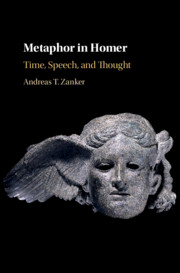Book contents
- Metaphor in Homer
- Metaphor in Homer
- Copyright page
- Contents
- Figures
- Preface
- Note on Texts and Translations
- Abbreviations
- Introduction
- Chapter 1 Ancient and Modern Views on Metaphor in Homer
- Chapter 2 Conceptual Metaphors for Time in Homer
- Chapter 3 Conceptual Metaphors for Speech in Homer
- Chapter 4 Conceptual Metaphors for Mind, Intention, and Self in Homer
- Conclusion
- Book part
- Bibliography
- General Index
- Index Verborum
- Index Locorum
Chapter 3 - Conceptual Metaphors for Speech in Homer
Published online by Cambridge University Press: 29 July 2019
- Metaphor in Homer
- Metaphor in Homer
- Copyright page
- Contents
- Figures
- Preface
- Note on Texts and Translations
- Abbreviations
- Introduction
- Chapter 1 Ancient and Modern Views on Metaphor in Homer
- Chapter 2 Conceptual Metaphors for Time in Homer
- Chapter 3 Conceptual Metaphors for Speech in Homer
- Chapter 4 Conceptual Metaphors for Mind, Intention, and Self in Homer
- Conclusion
- Book part
- Bibliography
- General Index
- Index Verborum
- Index Locorum
Summary
In this chapter, the author discusses how speech is conceptualized using highly physical vocabulary. Words can be "hidden" in the mind, or "retracted" ("grasped back"). He then discusses how words can be injected directly into the mental apparatus of the listener ("take it to heart"), and notes that the conduit metaphor of communication described by Michael Reddy and prevalent in the modern languges does not appear to be prominent in the diction of the Iliad and Odyssey. The author further discusses the metaphor of words as arrows, and applies conceptual blending theory to the problematic phrase "winged words", arguing that the metaphor takes arrows rather than birds as the framing domain. He then surveys further metaphors for speech involving building and the crafts, before discussing the collection metaphors for speech and understanding in Homer. At the close of the chapter, the author suggests ways in which Homeric metaphors for speech may highlight or hide aspects of the target domain (speech), and argues that the polysemy of terms such as μῦθος and ἔπος arrises out of a metonymy that exists in English as well.
- Type
- Chapter
- Information
- Metaphor in HomerTime, Speech, and Thought, pp. 103 - 164Publisher: Cambridge University PressPrint publication year: 2019

